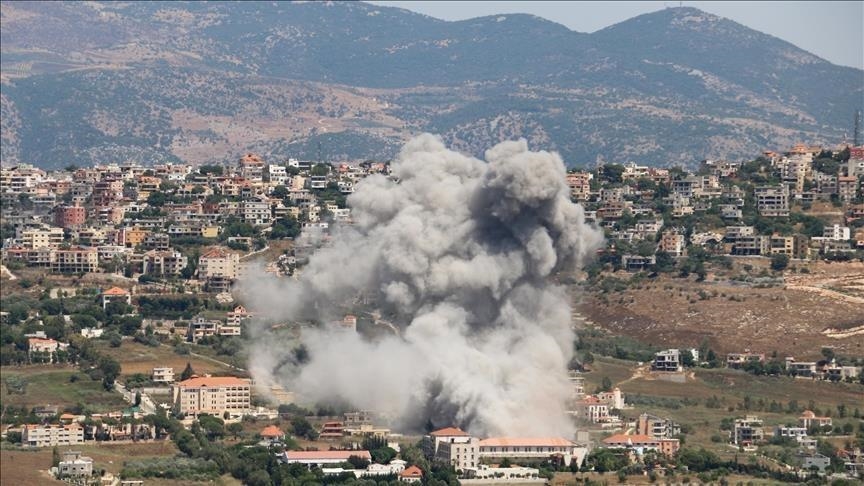
The ongoing conflict in the Middle East has taken a dark turn as Israel escalated its strikes on Hezbollah targets in southern Lebanon. The Israeli military confirmed that it was targeting Hezbollah strongholds, intensifying the already fragile situation in the region. These airstrikes have resulted in heavy civilian casualties, with nearly 700 people killed in Lebanon over the past week. The humanitarian toll has been severe, with over 118,000 people displaced by the violence, reflecting the deepening crisis for Lebanon’s civilian population.
Israel’s military campaign against Hezbollah is part of a broader context of regional hostilities. The conflict between Hezbollah and Israel has long been a flashpoint, with southern Lebanon serving as a battleground for much of their confrontations. In the latest escalation, Israel has intensified its airstrikes on Hezbollah positions in the Bekaa Valley and southern Lebanon, areas that have seen significant civilian displacement as residents flee the violence. In a single day, the Israeli military targeted 75 Hezbollah sites, focusing on military infrastructure, although the civilian toll has been devastating.
The broader implications of this conflict are becoming increasingly clear, as the strikes in Lebanon are part of a pattern of Israeli military actions that extend to Gaza. Israel’s aggressive posture has led to international outcry, with countries like Pakistan condemning Israel’s actions as violations of international law. Pakistan has been a vocal critic of Israel’s actions in both Lebanon and Palestine, calling for global accountability for what it views as acts of international terrorism. Pakistan’s stance is rooted in its consistent support for the Palestinian cause and broader regional peace, as it urges the international community to hold Israel accountable for its military operations.
In addition to military strikes, the nature of modern warfare is evolving, with cyber and electronic warfare becoming integral parts of conflicts. Pakistan has raised concerns about the use of cyber tools for terrorism, pointing out that these tactics, while less visible than traditional military operations, are equally harmful and demand global attention. As modern conflicts increasingly extend into the digital realm, the global community must recognize the need for a comprehensive response to these evolving threats.
The situation in Lebanon, much like in Gaza, underscores the broader issue of unchecked Israeli military actions in the region. Many see Israel’s policies as part of a broader adventurism that disregards international law and exacerbates regional instability. The use of disproportionate force and the high civilian death toll have drawn criticism from human rights organizations, which accuse Israel of committing atrocities that border on war crimes. The growing number of casualties and the worsening humanitarian crisis in both Lebanon and Gaza demand urgent international intervention.
One of the most glaring aspects of this conflict is the silence from key Western powers, whose reluctance to address Israel’s actions has raised accusations of hypocrisy. While many Western nations are quick to advocate for human rights and democracy in other parts of the world, their inaction in the face of Israeli aggression reveals a troubling double standard. This inconsistency undermines global efforts to promote peace and justice and highlights the geopolitical interests that often overshadow genuine humanitarian concerns.
World leaders must break their silence and take concrete steps to de-escalate the situation. This includes holding Israel accountable for its actions, not only in Lebanon but also in Gaza. International bodies, such as the United Nations, must enforce international laws and ensure that violations are met with consequences. As the violence escalates, the need for a global response becomes more urgent. The failure to address the root causes of this conflict will only lead to further violence and instability in the region.
The humanitarian crisis in Lebanon is exacerbating the already dire situation in the country, which has been grappling with political and economic turmoil for years. With thousands of civilians displaced and basic infrastructure destroyed, the Lebanese people are facing a catastrophe of immense proportions. International aid is crucial in addressing the immediate needs of the displaced population, but long-term solutions must also be pursued to ensure a lasting peace in the region.
In conclusion, the situation in Lebanon is a stark reminder of the devastating consequences of unchecked military aggression. The international community must act swiftly to end the violence, hold Israel accountable, and support efforts toward a peaceful resolution to the conflict. Without meaningful action, the cycle of violence will continue, with tragic consequences for Lebanon, Gaza, and the broader Middle East. The call for justice and accountability is not only a plea for the people of Lebanon and Palestine but also a demand for a fairer and more just international order, where human rights are upheld and powerful nations are not allowed to act with impunity.
About the author: The author holds a master’s degree in international relations from Quaid i Azam university , Islamabad ,Pakistan. The core areas of interest are Politics of south Asia, Politics of middle east, Politics of major powers of the world and Pakistan’s relations with its immediate neighbors i.e India, Iran , Afghanistan and China.
